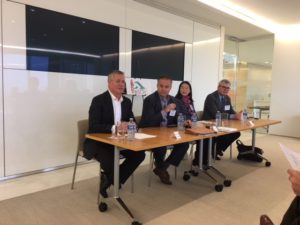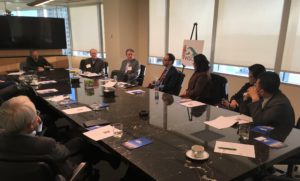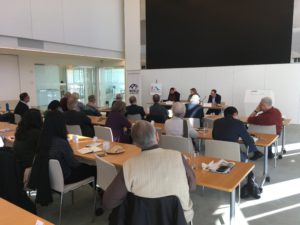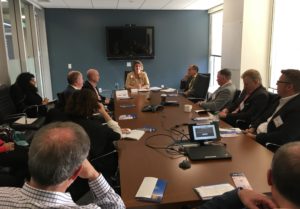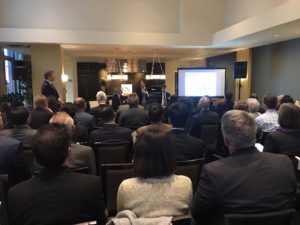
On November 8, 2017, the Washington State China Relations Council and Gold Member Kidder Mathews convened a panel of real estate experts for a conversation on, “Pacific Northwest and National Real Estate Trends: the China Factor.” Speakers included Holly Yang, Head of Seattle China Services for Kidder Mathews in Seattle, Vik Bangia, founder of Verum Consulting, and Glen Gioseffi, Debt Equity and Finance expert with Kidder Mathews. Brian Hatcher, Executive Vice President of Brokerage for Kidder Mathews, moderated this event at The Bravern Signature Residences in Bellevue, Washington.
Brian Hatcher launched the discussion with a 2017 commercial real estate market update for the Seattle and Bellevue areas. A comprehensive analysis of growth rates in commercial real estate indicates that continued and sustained growth can be expected, as exemplified by the pre-leasing of 50% of the office space currently under construction in Seattle and the 67% pre-lease rate in Bellevue.
Holly Yang expounded on financing options for Chinese investors, including the EB-5 immigrant investor program. She discussed the excessive wait time now associated with the popular EB-5 investment program and Chinese capital controls on outgoing real estate investment funds. Holly concluded that despite the Chinese government’s strong hand in directing capital, funds continue to flow to the US, which is viewed as a “safe haven” for investment money. Glen Gioseffi, who has funded over one billion dollars in commercial debt, contributed his knowledge of the necessity of debt financing to enable growth.
Vik Bangia shared findings from his research into the characteristics of the Millennial employees, a demographic which is occupying commercial space at an increased rate. Vik explained how this demographic tends to prize clarity, flexibility, satisfaction, and significance in the workplace, and how these values can be reflected even in a company’s commercial space. For example, the ratio of square foot to person has dropped in recent years from 200 square feet per employee to a mere 48 square feet per person.
The wide-ranging and extensive knowledge of the panelists created a superb venue for audience members to submit varied queries into the complexities of regional and national real estate trends. More than 60 representatives from the commercial and residential real estate, investment, banking, and legal communities attended this standing-room only event and exclusive networking reception.
Special thanks to Kidder Mathews for convening the panel and co-hosting with WSCRC, and to The Bravern Signature Residences for providing the outstanding venue.
Summary author: Trudy Boothman
